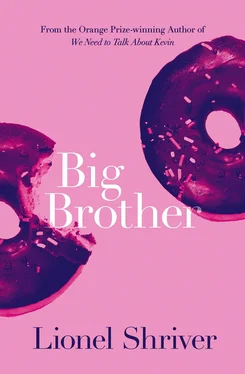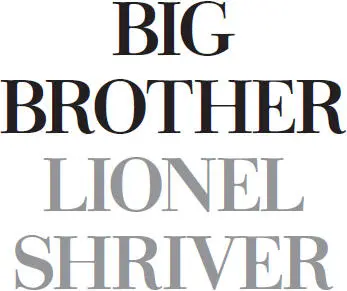
The Borough Press
An imprint of HarperCollins Publishers
1 London Bridge Street
London SE1 9GF
www.harpercollins.co.uk
First published by HarperCollins Publishers 2013
Copyright © Lionel Shriver 2013
Cover design by Stuart Bache © HarperCollins Publishers Ltd 2017
Cover photographs © Shutterstock.com
Lionel Shriver asserts the moral right to be identified as the author of this work.
A catalogue record for this book is available from the British Library.
This novel is entirely a work of fiction. The names, characters and incidents portrayed in it are the work of the author’s imagination. Any resemblance to actual persons, living or dead, events or localities is entirely coincidental.
All rights reserved under International and Pan-American Copyright Conventions. By payment of the required fees, you have been granted the non-exclusive, non-transferable right to access and read the text of this e-book on screen. No part of this text may be reproduced, transmitted, down-loaded, decompiled, reverse engineered, or stored in or introduced into any information storage and retrieval system, in any form or by any means, whether electronic or mechanical, now known or hereinafter invented, without the express written permission of HarperCollins.
Source ISBN: 9780007271108
Ebook Edition © 2014 ISBN: 9780007481651
Version: 2017-04-06
To Greg—who was unfailingly, improbably glad for anything good that ever happened to me, and in the face of whose drastic, fantastic, astonishing life any fiction pales.
One in Three Would Trade Year of Life for Ideal Body
Daily Telegraph headline, 24 March 2011
Table of Contents
Cover
Title Page
Copyright
Dedication
Epigraph
I: Up
Chapter One
Chapter Two
Chapter Three
Chapter Four
Chapter Five
Chapter Six
Chapter Seven
Chapter Eight
Chapter Nine
Chapter Ten
Chapter Eleven
II: Down
Chapter One
Chapter Two
Chapter Three
Chapter Four
Chapter Five
Chapter Six
Chapter Seven
Chapter Eight
Chapter Nine
Chapter Ten
III: Out
About the Book
Also by Lionel Shriver
About the Author
Praise for Big Brother
About the Publisher
I: Up
I have to wonder whether any of the true highlights of my fortysome years have had to do with food. I don’t mean celebratory dinners, good fellowship; I mean salivation, mastication, and peristalsis. Oddly, for something I do every day, I can’t remember many meals in detail, while it is far easier for me to call up favorite movies, faithful friendships, graduations. It follows, then, that film, affinity, and education are more important to me than stuffing my face. Well done, me, you say. But were I honestly to total the time I have lavished on menu planning, grocery shopping, prep and cooking, table setting, and kitchen cleanup for meal upon meal, food, one way or another, has dwarfed my fondness for Places in the Heart to an incidental footnote; ditto my fondness for any human being, even those whom I profess to love. I have spent less time thinking about my husband than thinking about lunch. Throw in the time I have also spent ruing indulgence in lemon meringue pies, vowing to skip breakfast tomorrow, and opening the refrigerator/stopping myself from dispatching the leftover pumpkin custard/then shutting it firmly again, and I seem to have concerned myself with little else but food.
So why, if, by inference, eating has been so embarrassingly central for me, can I not remember an eidetic sequence of stellar meals?
Like most people, I recall childhood favorites most vividly, and like most kids I liked plain things: toast, baking-powder biscuits, saltines. My palate broadened in adulthood, but my character did not. I am white rice. I have always existed to set off more exciting fare. I was a foil as a girl. I am a foil now.
I doubt this mitigates my discomfiture much, but I have some small excuse for having overemphasized the mechanical matter of sustenance. For eleven years, I ran a catering business. You would think, then, that I could at least recall individual victories at Breadbasket, Inc. Well, not exactly. Aside from academics at the university, who are more adventurous, Iowans are conservative eaters, and I can certainly summon a monotonous assembly line of carrot cake, lasagna, and sour-cream cornbread. But the only dishes that I recollect in high relief are the disasters—the Indian rosewater pudding thickened with rice flour that turned into a stringy, viscous vat suitable for affixing wallpaper. The rest—the salmon steaks rolled around somethingorother, the stir-fries of thisandthat with an accent of whathaveyou—it’s all a blur.
Patience; I am rounding on something. I propose: food is by nature elusive. More concept than substance, food is the idea of satisfaction, far more powerful than satisfaction itself, which is why diet can exert the sway of religion or political zealotry. Not irresistible tastiness but the very failure of food to reward is what drives us to eat more of it. The most sumptuous experience of ingestion is in-between: remembering the last bite and looking forward to the next one. The actual eating part almost doesn’t happen. This near-total inability to deliver is what makes the pleasures of the table so tantalizing, and also so dangerous.
Petty? I’m not so sure. We are animals; far more than the ancillary matter of sex, the drive to eat motivates nearly all of human endeavor. Having conspicuously triumphed in the competition for resources, the fleshiest among us are therefore towering biological success stories. But ask any herd of overpopulating deer: nature punishes success. Our instinctive saving for a rainy day, our burying of acorns in the safest and most private of hiding places for the long winter, however prudent in its way, however expressive of Darwinian guile, is killing my country. That is why I cast doubt on whether the pantry, as a subject, is paltry. True, I sometimes wonder just how much I care about my country. But I care about my brother.
Any story about a sibling goes far back indeed, but for our purposes the chapter of my brother’s life that most deserves scrutiny began, aptly, at lunch. It must have been a weekend, since I hadn’t already left for my manufacturing headquarters.
As usual in that era, my husband Fletcher had come upstairs on the early side. He’d been getting up at five a.m., so by noon he was famished. A self-employed cabinetmaker who crafted lovely but unaffordable one-of-a-kind furniture, he commuted all the way to our basement, and could arise whenever he liked. The crack-of-dawn nonsense was for show. Fletcher liked the implied rigor, the façade of yet more hardness, fierceness, discipline, and self-denial.
I found the up-and-at-’em maddening. Back then, I hadn’t the wisdom to welcome discord on such a minor scale, since Fletcher’s alarm-clock setting would soon be the least of our problems. But that’s true of all before pictures, which appear serene only in retrospect. At the time, my irritation at the self-righteousness with which he swept from bed was real enough. The man went to sleep at nine p.m. He got eight hours of shut-eye like a normal person. Where was the self-denial?
Читать дальше














